Today we mark 40th years from the horrors of the anti-Tamil pogrom of 1983, when Tamils were killed by Sinhala mobs backed by the then UNP government and state forces.
Sinhala rioters halt a minibus searching for Tamils Armed with electoral rolls, Sinhala mobs targeted Tamil homes and businesses looting and ransacking property. Driven from their homes, particularly in Colombo, over 3000 Tamils were massacred, whilst thousands more were effectively deported by the state to the North-East.
Eye witness reports described mobs chasing Tamils down the street with knives and setting them alight alive. Many hundreds of women were raped. Tamil political prisoners locked up in Welikada jail, deep within the island’s south, were also targeted as prison guards allowed Sinhala inmates to slaughter them.
We look back at events through international press coverage at the time:
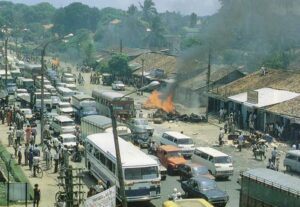 21 Jul 1983 – The Times:
21 Jul 1983 – The Times:
“The Government yesterday imposed local and foreign press censorship on all news about national security, law and order, essential supplies, and incitement to mutiny, riot or civil commotion.”
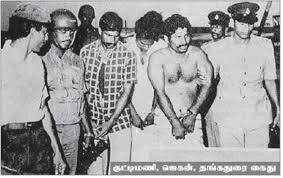 23 Jul 1983 – The Montreal Gazette
23 Jul 1983 – The Montreal Gazette
“The officials said 17 prisoners died in a jailbreak at the Welikada jail in the capital of Colombo, where 35 Hindu Tamil prisoners were massacred Monday by fellow inmates belonging to the nation’s Buddhist Sinhalese majority. Guards also opened fire yesterday on rioting Tamil prisoners in the jail of Jaffna, 386 kilometres north of Colombo killing three of them”
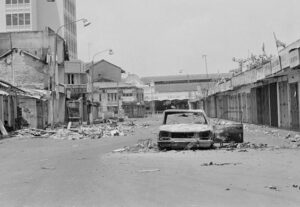 26 Jul 1983 – The Daily Telegraph:
26 Jul 1983 – The Daily Telegraph:
“Motorists were dragged from their cars to be stoned and beaten with sticks. Others were cut down with knives and axes. Mobs of Sinhala youth rampaged through the streets, ransacking homes, shops and offices, looting them and setting them ablaze, as they sought out members of the Tamil ethnic minority. A mob attacked a Tamil cyclist riding near Colombo’s eye hospital. The cyclist was hauled from his bike, drenched with petrol and set alight. As he ran screaming down the street, the mob set on him again and hacked him down with jungle knives.”
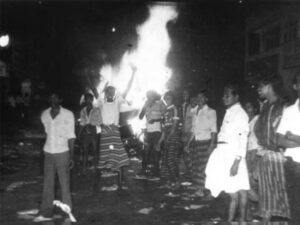 27 Jul 1983 – The Times:
27 Jul 1983 – The Times:
“Here in Britain some of the 25,000 Sri Lanka Tamils blamed the start of the fighting on an incident last week in which three teenage girls at a bus-stop near Jaffna in the north of Sri Lanka were allegedly abducted and raped by soldiers. On girl was later said to have committed suicide.
They also claim another atrocity in which six schoolboys were shot and killed by troops and police in the same area. They blame these incidents for prompting the attack by Tamil guerrillas on a Sri Lankan Army vehicle on Saturday, in which 13 soldiers were killed.”
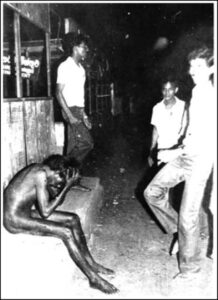 27 Jul 1983 – The Times :
27 Jul 1983 – The Times :
“These mostly involved in the present troubles are the Ceylon Tamils, a highly educated, superior minority, who feel victimized by the Sinhalese. Not only are there fewer industrial opportunities for them in the north but Tamil boys have been discriminated against in winning places at university”
“Despite their minority status the Tamils for years held top jobs in business and administration under the British, jobs they have mostly since lost under Sinhalese rule. The cause of the present violence must therefore be seen in part economic terms”
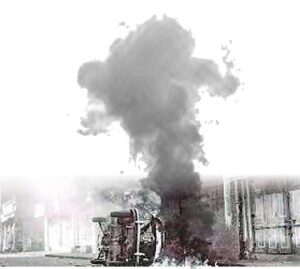 28 Jul 1983 – The Times :
28 Jul 1983 – The Times :
“Smoke from hundreds of shops, offices, warehouses and homes blew idly over Colombo yesterday. Any business, any house belonging to, or occupied by a Tamil has been attacked by gangs of goondas (hooligans) and the resulting destruction looks like London after a heavy night’s attention from the Luftwaffe.”
“Government officials yesterday estimated that 20,000 business had been attacked in the city and declared that there was a pattern of organisation and planning in the rioting and looting.”
“One of the principal reasons for Britain’s delay in granting independence to its former colony was because of fears that the majority would tyrannize the minority Tamils. But the majority Sinhala speakers feel that they are threatened by 40 million Tamil speakers in India.”
29 Jul 1983 – The Montreal Gazette :
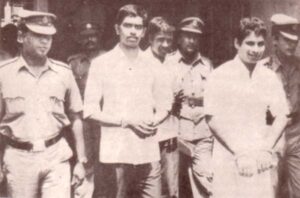
“Addressing the island nation on radio and television for the first time since violent clashes between majority Sinhalese and minority Tamil erupted six days ago, Jayewardene said the Tamil movement “should have been banned long, long ago. The Sinhalese will never agree to the separation of a country that has been a united nation for 2500 years,” Jayewardene said.
People who advocate separatism the president said, would lose all their “civic rights”, be banned from holding any office and preventing from practising a profession.”
A government official also confirmed that 130 Sinhalese sailors of the Sri Lankan navy broke from their barracks in the port city of Trincomalee Monday and burned 175 houses in a Tamil neighbourhood, killing one Tamil and wounding 10 others.
A Norwegian tourist reported seeing a Sinhalese mob pour gasoline on a minibus full of about 20 Tamils in Colombo and set it on fire. From Oslo, Eli Skarstein was quoted as saying, “Colombo was burning when we left. Women, children and old people were slaughtered. Police and soldiers did nothing to stop this genocide.”
Douglas Liyanage, secretary of the ministry of state, acknowledged that Sinhalese passengers on a Colombo-bound train from the central Sri Lanka town of Kandy had attacked Tamil passengers they suspected of carrying weapons. Passengers said one of the Tamils was chased naked and bleeding through the railway cars until he fell dead and was thrown off.
The wave of killings was touched off by the ambush and slaying of 13 Sinhalese soldiers by Tamil insurgent guerillas over the weekend. But the violence grows out of a century of deeply-rooted hatred, along with differences of language and religion between the Buddhist Sinhalese and the Hindu Tamils.”
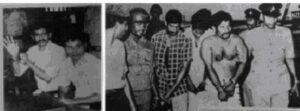 29 Jul 1983 – The Times :
29 Jul 1983 – The Times :
“Political parties advocating the partition of Sri Lanka will be banned, President J R Jayawardene announced yesterday as news emerged of a second massacre in Colombo’s main jail.
In an attempt to appease the mobs which have attacked Tamil homes and businesses, the President declared that those seeking partition will “lose their civil rights and cannot hold office, cannot practise professions, join movements of organizations”.
Mr Jayewardene said in a nationwide broadcast: “The government has not decided that the time has come to accede to the clamour and the request, the natural request, of the Sinhala people that we do not allow the movement for division to grow any more.”
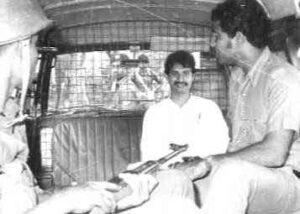 29 Jul 1983 – The Age :
29 Jul 1983 – The Age :
“Frustrated expectations of increased self-rule for the Tamil community, coupled with Government fears that its support from the majority Sinhalese was slipping, appear to have been the primary combustibles that ignited the worst violence in this scenic island nation since 1948.”
 01 Aug 1983 – The Sydney Morning Herald :
01 Aug 1983 – The Sydney Morning Herald :
“The Sri Lankan Government has cracked down on political opponents and appealed for public support, saying ethnic bloodshed on the island is part of a foreign-inspired plot to overthrow it.”
04 Aug 1983 – The Times:
“Sri Lanka Army personnel actively encouraged arson and the looting of Tamil business establishments and homes in Colombo. … Absolutely no action was taken to apprehend or prevent the criminal elements involved in these activities. In many instances army personnel participated in the looting of shops.”


